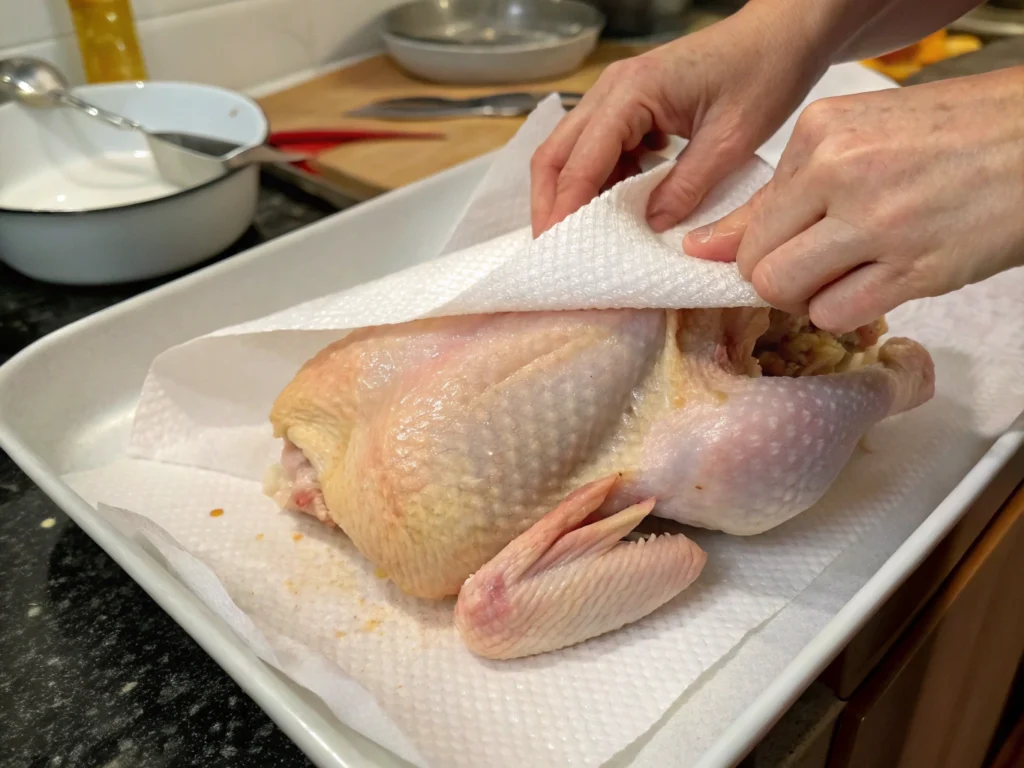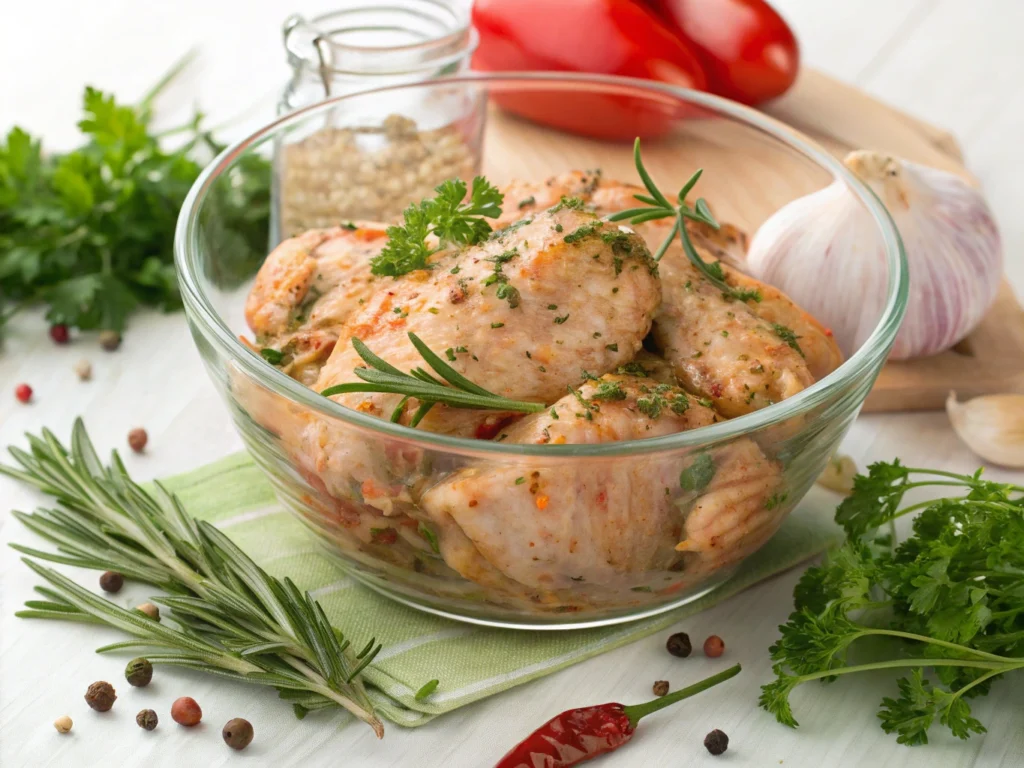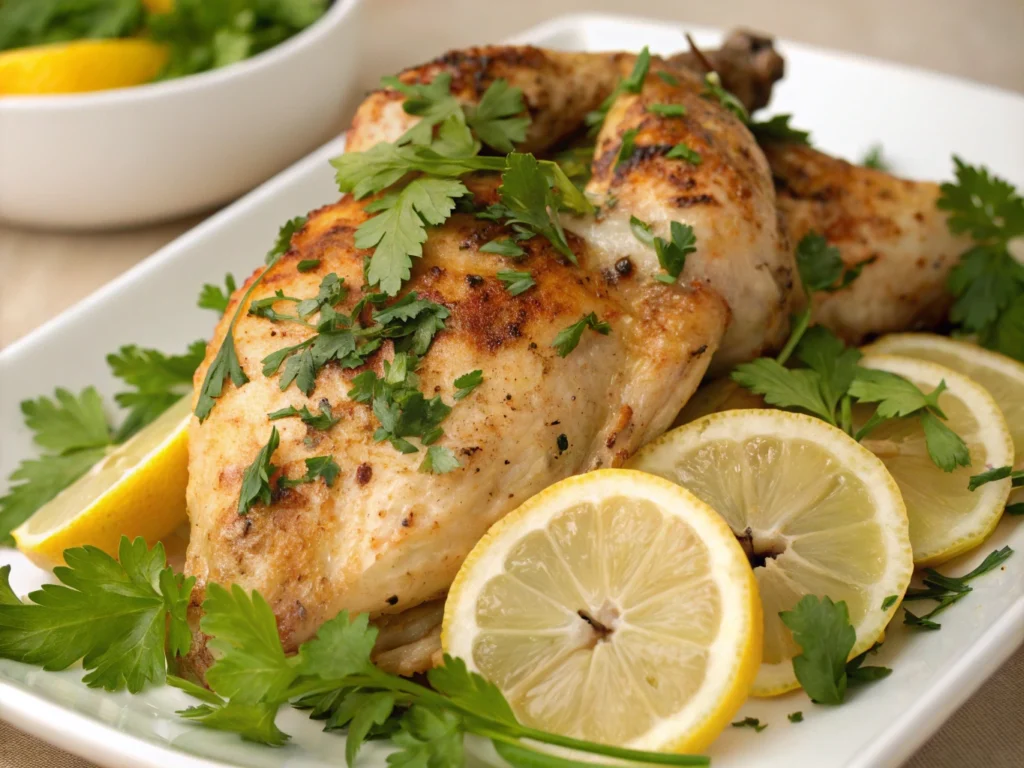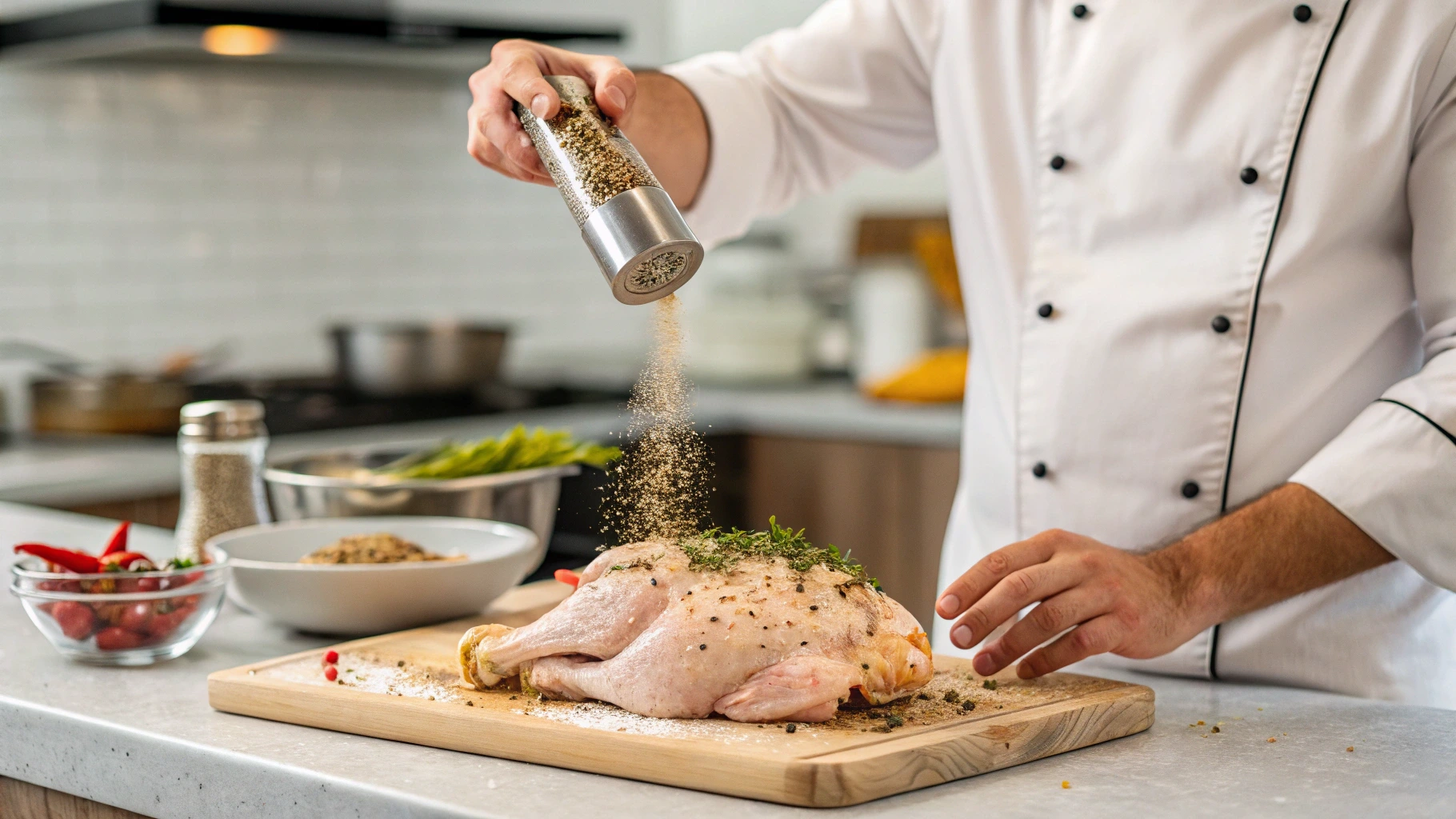Seasoning chicken is a critical step in creating a flavorful, juicy meal. But the question “How long to leave seasoning on chicken before cooking?” often arises, especially when trying to perfect the balance of taste and tenderness. The timing of your seasoning—whether it’s a quick 30-minute rub or an overnight marinade—plays a huge role in how the flavors develop and enhance the meat. In this guide, we’ll explore everything you need to know about seasoning chicken, from the basics of preparation to tips for experimenting with bold flavors. Let’s dive in!
Understanding the Importance of How Long to Leave Seasoning on Chicken Before Cooking
Seasoning timing is more than just sprinkling spices—it’s about getting the flavors to penetrate the chicken for a rich, harmonious taste. Timing determines whether your chicken will taste bland, overly salty, or perfectly seasoned.
What Does the Timing of Seasoning Mean for Flavor?
Seasoning timing refers to when you apply salt, spices, or marinades to chicken. This can vary from just before cooking to marinating for hours or even overnight. Timing affects how deeply the flavors seep into the meat. Too early, and the chicken might lose its natural juices. Too late, and the flavors won’t fully develop.
Why Does Seasoning Time Matter for Juicy Chicken?
Salt, for instance, does more than enhance taste—it’s a natural tenderizer. When allowed to rest on the chicken for at least 30 minutes, salt draws out moisture, forms a brine, and pulls those flavors back into the meat. Meanwhile, spices like paprika, garlic powder, or cumin need time to bind with the surface or seep into the chicken, creating layers of flavor.
Common Mistakes in Deciding How Long to Leave Seasoning on Chicken
Many people believe that seasoning chicken right before cooking is always best. While that works in a pinch, giving seasonings enough time—even 30 minutes—can elevate the flavor dramatically. On the flip side, marinating for too long (like 48 hours) can break down the chicken’s texture, making it mushy.
By understanding the science and art of seasoning timing, you can ensure every bite is packed with flavor, no matter the recipe!
Preparing Chicken to Maximize Seasoning Effectiveness
The way you prepare your chicken before seasoning can make or break its flavor. A little extra effort in prepping ensures the seasoning adheres well and penetrates deep into the meat, giving you delicious results.
How to Prep Chicken for the Perfect Seasoning Time
Before even thinking about how long to leave seasoning on chicken before cooking, you need to get the chicken ready. Proper preparation helps the spices or marinade stick better and work their magic. Without prepping, the flavors might not absorb evenly, leaving some bites bland and others over-seasoned.
Drying Chicken Before Seasoning: Why It’s Crucial

First, pat the chicken dry with paper towels. Excess moisture prevents seasonings from sticking and can create a watery mess during cooking. For whole chickens or thicker cuts, consider making shallow cuts in the meat. This allows the seasoning to seep in more effectively.
Next, choose your seasoning approach. Whether you’re opting for a simple salt-and-pepper mix or a complex spice blend, ensure even coverage by rubbing or massaging it into the chicken. Don’t forget to season under the skin if you’re cooking a whole bird—that’s where the real flavor magic happens!
The Best Techniques for Seasoning Chicken Quickly and Evenly
Moisture on the surface of the chicken creates a barrier that blocks the seasoning from sticking properly. Drying the meat not only improves flavor absorption but also helps achieve that golden, crispy exterior when cooking. For best results, always start with dry chicken.
Part 3: Comparing Dry Rubs and Wet Marinades for Chicken Seasoning
When seasoning chicken, there’s an ongoing debate: dry rubs or wet marinades? Both have their strengths, but which one you choose depends on your cooking method and how much time you have.
What Makes a Dry Rub Ideal for Quick Seasoning?
A dry rub is a mixture of spices, salt, and sometimes sugar, applied directly to the chicken’s surface. It’s ideal when you need to know how long to leave seasoning on chicken before cooking since dry rubs work quickly. They form a flavorful crust, locking in juices and adding texture.
Advantages of Using a Dry Rub
Dry rubs are quick and easy, perfect for when you don’t have hours to marinate. They’re also versatile—you can experiment with endless combinations of spices and herbs. Plus, dry rubs don’t add extra moisture, making them great for grilling, roasting, or frying.
Choosing Between Dry Rubs and Wet Marinades Based on Cooking Time
A wet marinade is a liquid-based mixture, often including oil, acid (like lemon juice or vinegar), and seasonings. It not only flavors the chicken but also tenderizes it. However, wet marinades need time—at least 30 minutes to overnight—to work their magic.
When to Use Wet Marinades for Chicken
If you’re grilling or roasting chicken, a marinade can enhance tenderness and infuse deep flavor. But beware of over-marinating. Letting chicken sit in a marinade for too long can cause the texture to become mushy, especially if the marinade is acidic.
Dry rubs are quick and flavorful, while wet marinades take more time but deliver richer depth. Choosing the right method depends on your dish and your timeline!
Ideal Timing for How Long to Leave Seasoning on Chicken Before Cooking
Knowing how long to leave seasoning on chicken before cooking can drastically affect the final flavor and texture. The timing depends on the method of seasoning, the type of chicken cut, and the cooking style.
How 30 Minutes of Seasoning Can Transform Your Chicken

For busy cooks, seasoning chicken 30 minutes before cooking is a quick way to boost flavor. During this short period, salt works its way into the meat’s surface, pulling in moisture and seasoning evenly. A dry rub of paprika, garlic powder, and black pepper can create a flavorful crust when cooked. If you’re in a rush, even 15 minutes can make a noticeable difference in taste.
Why Overnight Marinating Delivers Unmatched Flavor
Marinating chicken overnight infuses deep flavor, especially with wet marinades. This extended time allows acids, oils, and spices to fully penetrate the meat. However, marinate wisely! Too much acid (like lemon juice or vinegar) for over 24 hours can break down proteins, leading to mushy texture. For thick cuts like drumsticks or whole chickens, overnight marination delivers the best results.
Adjusting Seasoning Time for Grilling, Roasting, or Frying Chicken
Absolutely! Grilling or roasting benefits from longer seasoning times—ideally a few hours or overnight. On the other hand, for frying or sautéing, seasoning right before cooking works well since the high heat locks in flavor quickly. Adjust the timing to suit the cooking method to achieve juicy and flavorful chicken every time.
How to Avoid Over-seasoning Chicken
While it’s tempting to load on the seasoning, overdoing it can overpower the natural flavor of the chicken. Use just enough to coat the meat evenly, and if marinating for longer than a few hours, avoid excess salt to prevent dryness. Balance is key for perfectly seasoned chicken.
Part 5: How Long to Leave Seasoning on Chicken Before Cooking for Last-Minute Meals
Sometimes, life gets hectic, and planning ahead isn’t an option. Luckily, seasoning chicken right before cooking can still yield delicious results.
Why Immediate Seasoning Works for Quick Chicken Recipes
Seasoning just before cooking ensures that the spices stay fresh and vibrant. Salt works immediately to enhance flavor without drawing out too much moisture. A quick rub of spices like cayenne, cumin, and oregano can create a bold flavor profile, even with minimal time. This method is particularly effective for sautéing or stir-frying, where high heat intensifies the seasoning.
The Benefits of Fast Seasoning for Pan-Fried and Roasted Chicken
Immediate seasoning works best for smaller cuts of chicken, like thighs or tenders, that cook quickly. It’s also ideal for pan-fried dishes where seasoning caramelizes on the surface. For baking or roasting, this method delivers crisp, flavorful skin and juicy meat. Even if you’re short on time, seasoning at the last moment ensures the dish isn’t bland.
Quick Tips for Applying Flavorful Seasonings at the Last Minute
Be sure to coat the chicken evenly with your seasoning mix, and don’t skip the basics like salt and pepper. Press the spices gently into the meat to help them adhere, especially for dry rubs. If you’re using a glaze or sauce, add it during the last few minutes of cooking to avoid burning.
For more tips on seasoning techniques, check out this helpful guide on How to Make Chicken More Flavorful.
Part 6: Enhancing Flavor Post-Cooking with Strategic Seasoning
Seasoning doesn’t end once the chicken is cooked. Adding the finishing touches after cooking can elevate your dish and enhance its flavor even further.
The Role of Post-Cooking Seasoning for Chicken Dishes
Once your chicken is off the heat, allow it to rest for a few minutes. This step is crucial as it lets the juices redistribute throughout the meat, ensuring each bite is tender and flavorful. During this time, you can sprinkle finishing salt, like flaky sea salt, for an extra burst of flavor. A dash of black pepper or a pinch of chili flakes can also add a fresh pop of spice.
For those wondering how long to leave seasoning on chicken before cooking, post-cooking seasoning is an often-overlooked opportunity to build layers of taste.
Using Fresh Herbs and Acidity for Balanced Chicken Flavors

Brighten the flavors of your chicken with a squeeze of fresh lemon or lime juice. A splash of balsamic vinegar or a drizzle of honey can also bring out the natural sweetness of the meat. Don’t forget fresh herbs like parsley, cilantro, or dill—they not only add aroma but also a vibrant touch to your presentation.
These small steps make a big difference, creating a dish that’s well-rounded, aromatic, and irresistibly delicious.
Experimenting with Flavor Profiles (200 Words)
If you’re stuck in a seasoning rut, it’s time to get creative. Mixing and matching seasonings can unlock exciting, bold flavors for your chicken dishes.
Mixing Classic and Bold Seasonings for Chicken Recipes
Start with basics like garlic powder, onion powder, paprika, and black pepper. Then, introduce unique ingredients like smoked paprika, curry powder, or sumac for a twist. Experimenting with how long to leave seasoning on chicken before cooking for these blends can also enhance the depth of flavor.
For example, a quick dry rub of cumin, coriander, and cayenne pepper creates a smoky, spicy crust. Or, try a zesty marinade with lemon juice, olive oil, and fresh thyme for a Mediterranean vibe.
Exploring Global Flavors to Match Your Seasoning Time
Explore global seasonings to transform your dishes. A harissa spice blend can give your chicken a North African flair, while a teriyaki marinade offers a savory-sweet Asian profile. Don’t shy away from experimenting with combinations like honey and mustard or citrus and herbs.
By trying new flavors and techniques, you’ll not only improve your cooking but also discover the seasoning style that suits your taste buds best.
FAQs on How Long to Leave Seasoning on Chicken Before Cooking
Questions about seasoning chicken often come up, especially when trying to perfect flavor and texture. Below are answers to some of the most common queries, including tips on how long to leave seasoning on chicken before cooking.
Should You Season Chicken Hours Before Cooking or Immediately?
For optimal flavor, season chicken at least 30 minutes before cooking. This gives the seasoning time to penetrate the meat. If you’re planning ahead, seasoning chicken up to 24 hours in advance is even better, especially if you’re using a marinade. Longer marination enhances flavor and tenderness, ensuring your chicken is juicy and flavorful.
Does the Type of Seasoning Impact Cooking and Flavor Timing?
Yes, seasoning chicken just before cooking is fine if you’re short on time. While it won’t have as much depth as a longer marinade, even a quick application of salt, pepper, and spices will elevate the dish. Be sure to coat the chicken evenly for the best results.
What Happens if You Season Chicken Too Early?
Seasoning chicken too far in advance—over 24 hours—can affect its texture. Acidic marinades can break down proteins, leading to a mushy consistency. To avoid this, stick to the recommended time frame.
Does the Type of Seasoning Affect Timing?
Absolutely! Dry rubs can be applied closer to cooking time, while wet marinades need at least 30 minutes to work. The method and seasoning choice will impact how long to leave seasoning on chicken before cooking.
How Does Cooking Method Influence Seasoning Time?
Grilling and roasting benefit from longer seasoning times, while frying or sautéing works well with quick seasoning. Adjust your approach based on your cooking method for the best results.
Mastering these basics ensures flavorful, well-seasoned chicken every time!

